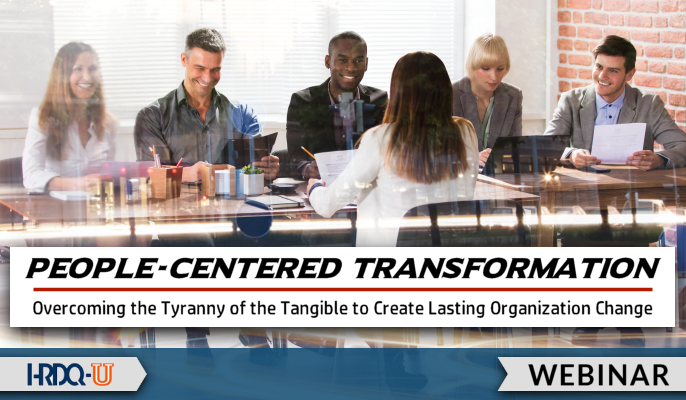
Changing organizations is hard. Research shows that organization transformation efforts fail more than 70% of the time. That is a lot of wasted time and effort that ultimately yields very little value for the organization and a huge amount of frustration for its people.
Organizations cannot change unless their people change. Research shows that people do not resist change, they resist being changed. Most transformation efforts fail because leadership over-emphasizes the tangible side of change and under-emphasizes the emotional one. Successful organization transformation requires an empathic, people-centered approach to change that nurtures a culture of aspiration, alignment, autonomy and accountability.
During this webinar, we will explore the ten key elements of People-Centered Transformation (PCT) and identify the three key leadership shifts required to activate each element.
Leave this session with a clear understanding of the priority PCT element requiring activation within your own organization and a focused plan to make the leadership shifts required to activate it.
Dr. Tony O’Driscoll is a professor, speaker, author, and advisor whose engaging message emphasizes that the key digital-age differentiator is not technology, but people.
Dr. O’Driscoll’s current appointments as Adjunct Professor at Duke University’s Fuqua School of Business and the Pratt School of Engineering, coupled with his role as Research Fellow at Duke Corporate Education, afford him the unique opportunity to apply cutting-edge academic research to address increasingly complex business challenges.
Dr. O’Driscoll is a frequently invited speaker at both corporate and academic conferences. He has been a keynote speaker, workshop leader, moderator, speaker, and panelist at over 130 national and international conferences. He has also provided expert analysis and interviews to media outlets such as The Wall Street Journal, Business Week, Wired Magazine, The Financial Times, India Today, Chief Learning Officer Magazine, Training Magazine, and for industry analysts such as Gartner and Forrester.
Tony has authored and co-authored articles for business periodicals such as Harvard Business Review, The Financial Times, Strategy and Business, and Dialogue and he writes the “Learning Matters” column for Training Magazine. His new book, Everyday Superheroes, proposes a revolutionary People-Centered Transformation (PCT) approach to enable sustained and sustainable organization agility.
Training Tools for Developing Great People Skills
This event is sponsored by HRDQ. For 45 years HRDQ has provided research-based, off-the-shelf soft-skills training resources for classroom, virtual, and online training. From assessments and workshops to experiential hands-on games, HRDQ helps organizations improve performance, increase job satisfaction, and more.
Learn more at HRDQstore.com

Sign up for more as a member of HRDQ-U
HRDQ-U offers much of its learning content free to visitors, including live and select webinars, blog posts, and more, with new events and posts shared every week. However, there is much more learning available. You can access our complete library of on-demand webinars and other training events and content by simply signing up.
2 Responses
Question: Which of the PCT elements should you focus on first?
Answer: So if you go, let me go here. If you look closely PCT element one, two and three are slightly darker, right. So if you were to take your PCD quiz, right, and you’re fine on one, two, and three, then go to the one that’s scores lowest, the one that’s closest to the MERV, that’s the one that’s closest to have the hierarchical behavior is. But you want to make sure these three are in place first, because those are really the foundation if you don’t have a real clear, compelling change narrative, if you don’t have your leaders acting differently, and if you don’t have your leaders being vulnerable and open, it’s almost like unless you’ve got that core to build from, you’re in trouble. Other than that, it doesn’t matter which order you move in.
Question: What is the best way to implement PCT? Do you start at the individual team or organization level?
Answer: That’s a great one. So you can do it any way you want. Right? So if you go back to looking at the PCT, as it’s currently written, it says our leaders, if you want to make that about yourself, you can say I, I communicated clear, concise and consistent and compelling, right. So so you can do it at an organization level. So I’ve worked with leadership teams, like executive teams, where we’ve taken this survey, and this is like, what do people feel about the organization? And what’s the PCT element we want to work on together? Or I’ve worked within functions or teams, where a team leader will just take this and work with his or her team to say, Okay, what do we work on first, and they work on individually, they work on it collectively as a team, or for yourself, you can ask yourself, which one of these things do I feel I have a gap in, that I should work on myself. So that’s the thing about this as you can come in at any level, organization, team or individual. And that’s, that’s the idea is that what we want to do is we want to make the shifts in the leadership behavior, right? Around the belief that we should be people centered. And whether you do that bottom up or top down? Doesn’t, you know, doesn’t matter?